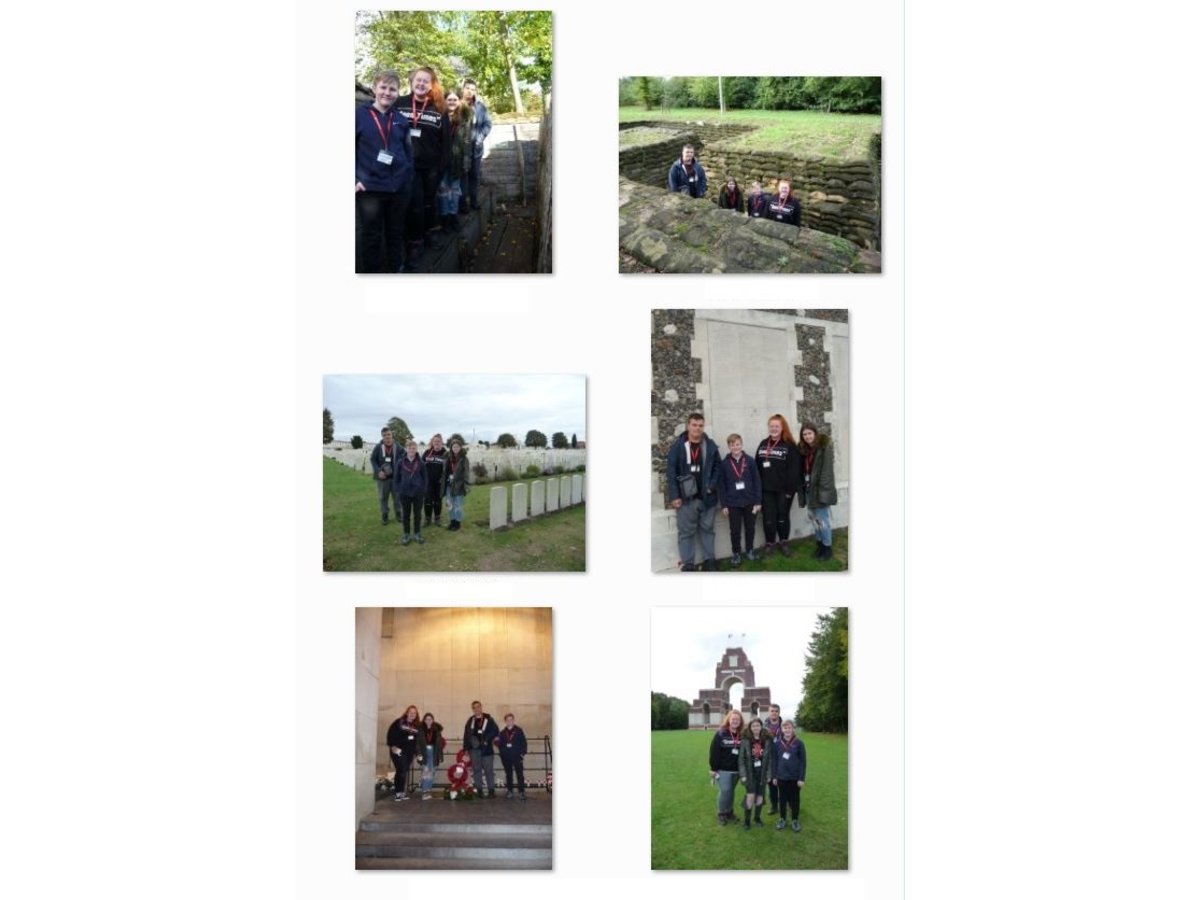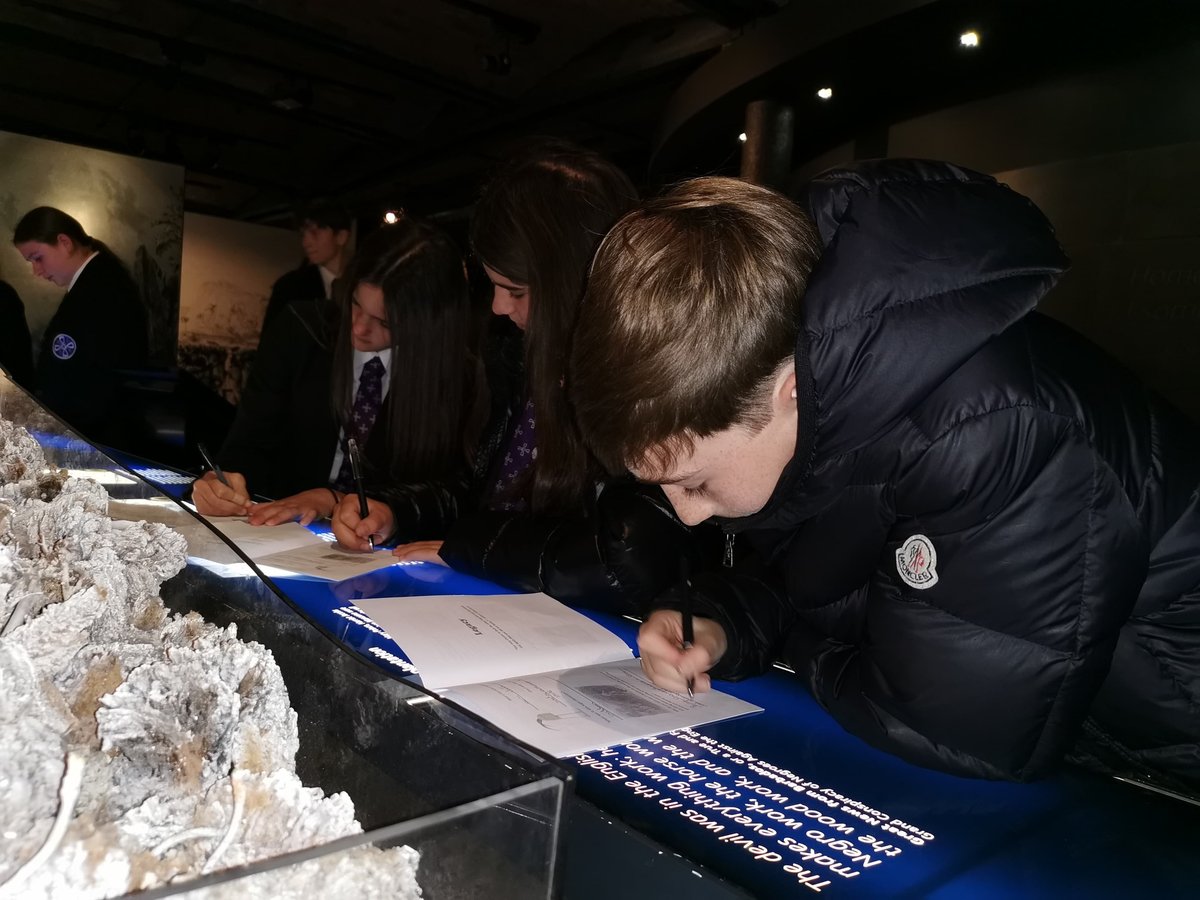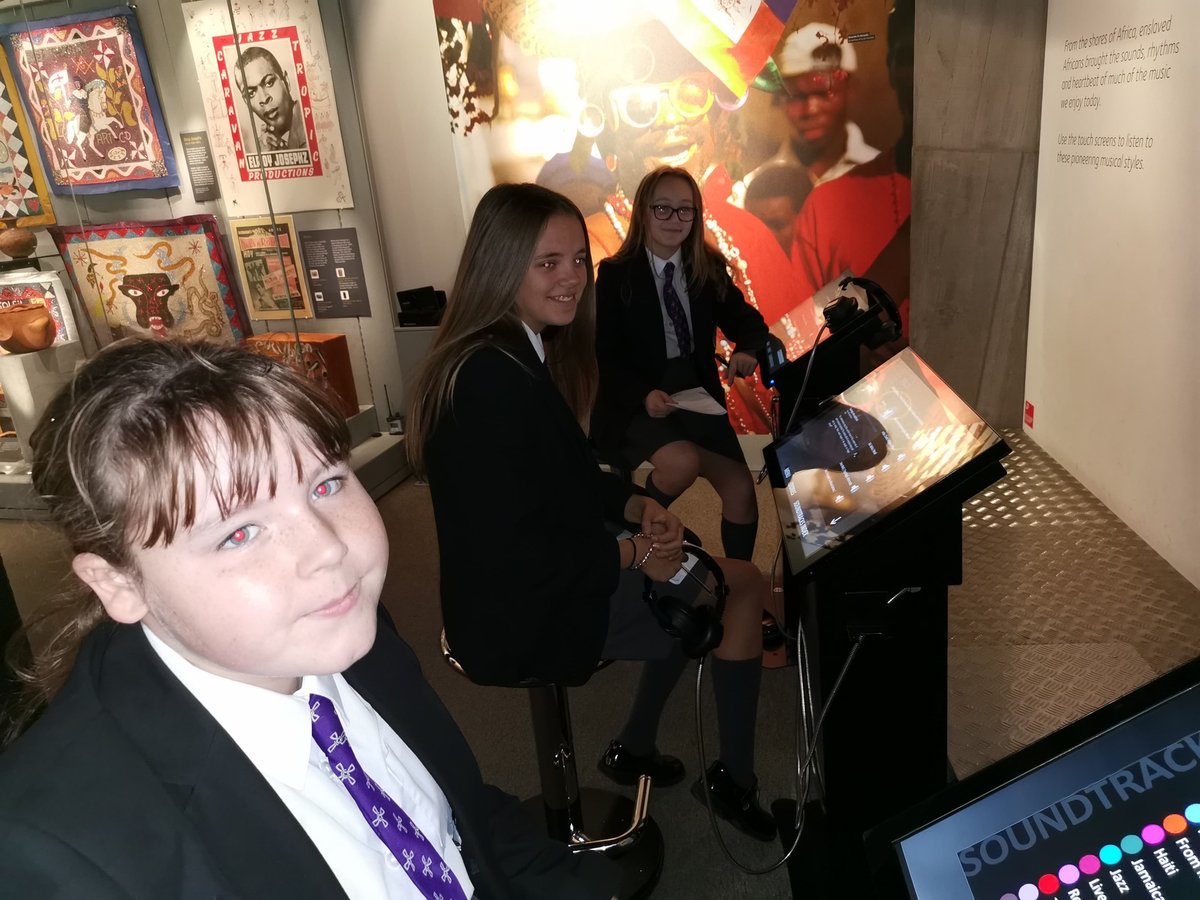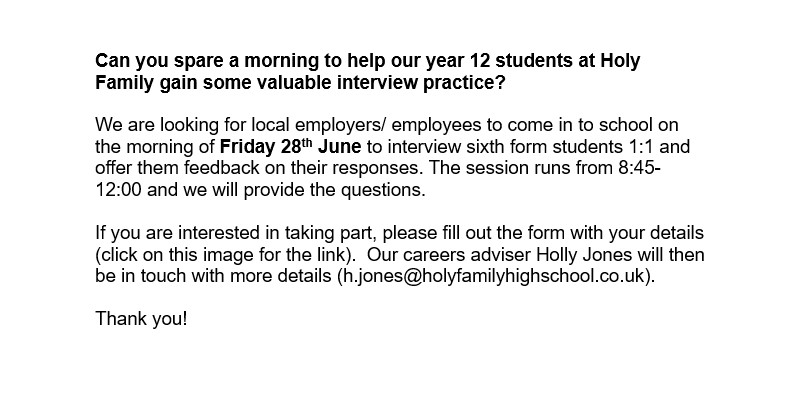History
Head of Department - Mr J. Flannigan
The aims behind the teaching of History at Holy Family are:
- To fire pupils’ curiosity and imagination in History.
- To move and inspire students.
- Help pupils develop their own identities through an understanding of history at personal, local, national and international level.
- To help pupils find out about the history of their community, Britain, Europe and the world.
- To develop a chronological overview that enables them to make connections within and across different periods and societies.
- To investigate Britain’s relationships with the wider world and relate past events to the present day.
- To encourage students to ask questions, evaluate evidence, identify and analyse different interpretations of the past.
- To teach students to substantiate arguments and judgements they make.
- To prepare students for the future, equipping them with transferrable knowledge and skills for later life.
- To encourage students to take part in a democratic society.
- To give students an understanding of the historic origins of our ethnic and cultural diversity.
Key Stage 3
The KS3 curriculum is designed to capture pupils' interest, instil a passion for learning and develop pupils' sense of place. Lessons also introduce key skills, such as source evaluation, debating an issue and using evidence to form a coherent argument. Our marking points (typically every five lessons) focus on the key skills in History: e.g. causation; use of sources; extended writing; similarity and difference (and more). We use these marking points to check pupils’ understanding and to monitor progress.
The curriculum generally follows a chronological order, examining key events in British history and in a wider global context. However, we have also built in depth studies which give pupils an idea of change over a longer period of time.
Year 7 starts with a focus on medieval English history, looking at key events like the Battle of Hastings and the murder of Thomas Becket. Modern attitudes towards illness and medicine are contrasted with the impact of the Black Death on the medieval period. We then move on to the Tudor and Stuarts (15th to 18th century). As many pupils have already covered the Tudors in KS1 and KS2, our focus is more on the reign of Richard III. Here we use the topic to examine historical interpretations and make links to the portrayal of Richard III by Shakespeare. This makes links with the theme of propaganda (used later in the Key stage and at GCSE). We then look at key events during the Stuart period, particularly the Gunpowder Plot and the execution of Charles I. Pupils will have the opportunity to assess the most successful Stuart monarch based on their own evidence. We then move on to our first local study, examining the early history of Liverpool. In particular, we examine the impact of the docks in Liverpool’s development as a major international city. Year 7 finishes with our first synoptic (overview study), with a focus on migration. Here we examine the history of migration to Britain over a 1000 year period. We assess the impact migrants have had on the development of Britain and assess the legacy of migration in the 21st century.
Year 8 starts off with a focus on the Industrial period in British history. The unit looks at living and working conditions during the Industrial Revolution. However, there is also an opportunity to examine the context of the Whitechapel murders of 1888. We also examine Britain's role in the wider world, with a study in depth of the colonisation of India, with particular focus on the impact of partition following World War Two. Our second synoptic study looks at the development of medicine over a 1000 year period. We pay a particular focus on the development of medicine in 20th century, including the impact of warfare and the development of the NHS. This provides a good bridge towards our next study, the causes and key events of World War One. We use this time period to also examine the extension of the vote to women after the Great War. Next, as a non-European study, pupils examine key events in the history of the USA. Initially, pupils examine the causes and impact of prohibition. We return to events in the USA in Year 9. Year 8 finishes with a study of the inter-war period, with a focus on Hitler’s rise to power and the causes of World War Two.
The final year of the Key Stage, Year 9, is mainly devoted to key events of the 20th century. We start off the year with a detailed study of World War Two key events & turning points like the Dunkirk evacuation, to understand how Britain and the Allies 'won' the war. We also spend a number of lessons looking and the causes, key events and legacy of the Holocaust. To “finish” the story of the Second World War, we then look at its main legacy: the Cold War. This is a short topic, examining causes and key events of the Cold War. We then return to our non-European study, examining key events in 1960s America. This gives pupils the opportunity to examine race and gender politics in America. Time is also spent studying the Vietnam War (particularly its unpopularity) and the Moon landing of 1969. Following this, we resume the local study of Liverpool. Here we examine 20th century events, like the blitz and the Hillsborough Disaster, and assess the lasting legacy of these events on Liverpool. Year 9 concludes with a final synoptic study on Crime and Punishment. This is designed to give all pupils an idea of change over time in the criminal justice system. It also provides the opportunity to transition pupils towards a possible GCSE in History (in Year 10).
Every topic in KS3 is concluded with a marking point. These marking points have been specifically designed by the department to assess pupils’ use and understanding of key historical skills. It also gives the department the chance to check for misconceptions and gaps in knowledge. Pupils also complete two overview assessments, typically in January and June. These assessments assess a range of historical skills and also include a knowledge “quiz”. Each topic also includes a homework activity linked to the time period. These homework tasks are designed to cover topics not covered in class. Pupils use web links provided to independently research and answer questions on a range of topics. In Year 7, for example, pupils will examine the Byzantine Empire, Incan civilization and Louis XIV of France.
History Key Stage 3 Curriculum Map
Key Stage 3
At Holy Family, pupils who pick History will follow the EDEXCEL 2015+ History course: https://qualifications.pearson.com/en/qualifications/edexcel-gcses/history-2016.html
The KS4 History course starts in Year 10 (a two-year course). Pupils study four separate topics as part of our History GCSE course:
- Anglo-Saxon and Norman England. A study of the Norman Conquest and the impact of the Norman invasion on Anglo-Saxon society.
- Weimar and Nazi Germany. This part of the course is mainly based on primary sources and historical interpretations. The focus is on life in Germany after World War One. We then look at Hitler’s rise to power and the impact this had on German society.
- Superpower Relations (the Cold War). This topic focuses on the period after World War Two, when Europe and the wider world was divided into two power blocs – NATO v the Warsaw Pact. The course looks at the key events in the Cold War (particularly in Europe), ending with the collapse of the USSR in 1991.
- Crime and Punishment. This topic is an overview of crimes, punishments and enforcement over a 1000 year period (1000 to the present day). It gives pupils a sense of change over a long period of time. It would be a brilliant introduction to the Criminology course studied at KS5.
The aim is to finish the entire GCSE course by Easter of Year 11, to allow time for exam practice and technique. All courses include assessment points based on past GCSE papers. This gives the department an accurate method of charting pupils' progress in History. All topics also include homework activities linked both to factual recall of key knowledge and GCSE exam-style questions.
History Key Stage 4 Curriculum Map
Key Stage 5
Course & Topics
We follow the OCR A-Level curriculum. Offers one of the most straight forward examinations (in terms of lay out & questions answered). Also offers the best choice of topics, designed to boost/retain pupil interest in the subject.
Deliberately picked topics to avoid repetition with KS4. This way pupils are given a greater breadth of historical knowledge.
- Britain = gives pupils a good introduction to contemporary politics (up to 1997).
- Russia = engaging topic for pupils. Builds on prior knowledge of the Cold War (covered at GCSE) & links with the Nazi dictatorship (e.g. use of propaganda and secret police).
- Ireland = introduced due to local Liverpool context & links with Ireland.
- Coursework = focused primarily on American Civil Rights (not covered at GCSE). Enables chance to build on subject specialism of teacher.
Teaching
Course split into units, with teachers responsible for teaching separate units.
- JF: responsible for teaching of Russian and Ireland units (55% of course)
- CP: responsible for teaching of Britain and Coursework units (45% of course).
KS4 Transition
Units covered avoid direct overlap / repetition with GCSE course. Do cover some key concepts, which are addressed in the lessons. Transition materials, including independent reading lists, are provided to pupils at the end of Year 11 / beginning of Year 12.
Retention
Very high retention rates in History at A-Level. Pupils are generally expected to achieve a Grade 6 in History. Pupils are allowed to study History A-Level without previously studying GCSE History, again if they have a strong (6+) grade in GCSE English.
History Key Stage 5 Curriculum Map Overview
|
|
Unit 1 |
Unit 2 |
|
Year 12 New OCR A-Level |
Britain 1930–1997 (Enquiry topic: Churchill 1930–1951)
Code: Y113
Worth: 25% of A-Level |
Russia 1894–1941
Code: Y219
Worth: 15% of A-Level |
|
|
Unit 3 |
Unit 4 |
|
Year 13 |
Britain and Ireland 1791–1921
Code: Y316
Worth: 40% of A-Level |
Topic-based essay (coursework). Possibly on USA 20th century Civil Rights.
Code: Y100
Worth: 20% of A-Level |
Britain 1930–1997
|
Links to prior knowledge |
In the KS3 curriculum pupils cover the following units which give a basic background knowledge; |
|
|
Course structure |
Using OCR delivery guide, the course breaks down into two areas of enquiry and is taught chronologically Churchill 1930–1951 British Period Study: Britain 1951–1997
|
|
|
Essential knowledge |
Churchill 1930–1951 Churchill’s view of political events 1929–1940 with a particular understanding of his stance on appeasement, rearmament and the Empire. Churchill as wartime PM including how he became PM, his style of leadership, relations with his generals, strategic decisions during the war, reconstruction plans and the loss of the May ‘45 election. Churchill and international diplomacy Churchill’s view on Britain’s imperial role, his relationship with the rest of the Grand Alliance and Post-War attitudes.
|
Conservative domination 1951–1964
Labour and Conservative governments 1964–1979
Thatcher and the end of consensus 1979–1997
|
|
Britain’s position in the world 1951–1997 Relations with and policies towards the USA and the USSR; Britain’s influence at the UN; role in Europe; nuclear policy; response to crises; decolonisation and changing attitudes to the Commonwealth.
|
||
|
Assessment points
|
Pupils are given a number of adapted past paper questions, both Part A (30-mark source analysis) and Part B (20-mark knowledge essay. Pupils also have a booklet for each style of question with questions, essay plans and model answers.
|
|
|
Assessment point examples |
Churchill
Using these four sources in their historical context, assess how far they support the view that Churchill was thought to be extreme when it came to the situation in India and British policy towards it. (30)
|
Britain Assess the reasons why Labour lost three elections in the period from 1951 to 1964. (20 marks)
Thatcher’s policies were successful in restoring the country’s economy. How far do you agree? (20 marks)
Assess the reasons why Labour lost three elections in the period from 1951 to 1964. (20 marks)
|
|
International Relations How far do you agree that relations between Britain and Russia were characterised more by hostility than friendship? (20 marks)
|
||
|
Synoptic assessments |
Pupils complete a timed essay every few weeks. They complete a past paper in spring term year 12. They may complete a full paper in the Summer mock exam series. They also complete a full past paper during the Year 13 mocks, typically end of January. |
|
|
Year 13 revision |
Pupils are given exam questions covering past topics every few weeks during Year 13. |
|
Russia 1894 to 1941
|
Links to prior knowledge |
Following changes to KS3 curriculum, pupils do cover the causes of the Russian revolution & are given an overview of Lenin / Stalin’s rule of the USSR. Link to concepts mainly covered in Weimar & Nazi Germany course at GCSE: totalitarian; propaganda; police state; indoctrination. |
|
|
Course structure |
Using OCR delivery guide, course breaks down well into four topics – taught chronologically:
Stalin’s leadership of Russia 1924 to 1941 |
|
|
Essential knowledge |
Nicholas’ Reign Russia geography & social structure (e.g. peasants, aristocracy). Key elements of Nicholas’ rule: economic policies (Witte & Stolypin); Unshakeable Authority. Causes, events & impact of 1905 Revolution. Repression after 1905, including the Duma. The situation in Russia in 1914. |
1917 Revolutions The key events of WWI & the impact on Russian politics. The role played by Rasputin & impact on Nicholas. Nicholas’ mistakes during WWI. Causes & events of the February Revolution. Policies & mistakes of the PG. Policies of the Bolsheviks. July Days. Kornilov Affair. Causes & events of the October Revolution. |
|
Bolshevik Survival Initial Bolshevik policies: Lenin’s Decrees; the Constituent Assembly. Causes & events of the Civil War. War Communism v the NEP. Role of Trotsky & Lenin. The death of Lenin. |
Stalin Stalin’s rise to power. Establishment of the police state & impact on society. Methods of control, including censorship, cult of personality & culture. Economic policies: collectivisation & Five Year Plans. Changes to society: women, children & workers. |
|
Britain & Ireland 1791 to 1921
|
Links to prior knowledge |
For current KS5 pupils, no specific links to prior taught knowledge. Individual knowledge of Ireland & its history very mixed. New KS3 unit introduced, covering history of Ireland from Tudor times up to present day. Will take time before KS5 pupils have completed this unit. Therefore adapted KS3 unit used to give a short introduction to the course before A-Level content covered. |
|||
|
Course structure |
Following OCR guidance, course taught in themes & depth studies – not chronologically. Therefore, there is a lot of overlap between units:
Theme – the Irish economy & Nationalism |
|||
|
Essential knowledge: themes |
Nationalism Definitions of key terms, e.g. nationalist; constitutional; revolutionary. Key examples of revolutionary nationalism: 1798 rebellion; Young Ireland; IRB; Easter Rising & Anglo Irish War. Key examples of constitutional nationalism: O’Connell & Emancipation; Home Rule 1-3; Parnell, Redmond & IPP. Cultural nationalism. |
British Policies Different aims, policies of Tories (Conservatives) & Whigs (Liberals). Focus on key policies of British governments towards Ireland: Act of Union; Emancipation; 1830s reforms; Corn Laws; Role of Gladstone; Home Rule 1-3; Anglo-Irish Treaty and Partition. |
||
|
Unionism General definition of Unionism, both in Ireland and Britain. Examples of Unionism in Ireland: Orange Lodge; Brunswick Clubs; development of independent Unionism; 20th century Unionism – Ulster Day, UVF & 36th Division. Examples of British Unionism linked to institutions & political parties. |
The Economy Economic differences in Ireland & the problems with industrialisation. The development of industry in Ulster. The link between Nationalism and the economy, mainly focused on the famine & land issues. |
|||
|
Assessment points |
Pupils are given a number of adapted past paper questions, both Part A (10 mark comparison) and Part B (20 mark agreement questions). |
|||
|
Assessment point examples |
Nicholas’ Reign Which of the following was more important in causing the 1905 Revolution? The Russo-Japanese War; The domestic policies of Tsar Nicholas II (10)
How far did Witte succeed in his plans to reform Russian industry in the years 1893-1903? (20) |
1917 Revolutions Which of the following was of greater importance in the Bolshevik take over in the October 1917 revolution?
Kerensky’s mistakes; The leadership of Lenin (10)
How far were the problems faced by the Provisional Government in 1917 a consequence of the continuing war with Germany? (20)
|
||
|
Bolshevik Survival Which of the following was more important for the Bolshevik victory during the Civil War? the leadership of Trotsky; the division of the Whites. (10)
“The introduction of the NEP in 1921 was more important as a political move than as an economic one.” How far do you agree? (20)
|
Stalin Which of the following had the greater consequences for the Soviet People? Collectivisation; Industrialisation. (10)
Assess the importance of the purges in maintaining Stalin’s control over the USSR in the period 1929-1941. (20) |
|||
|
Synoptic assessments |
Pupils complete a full (adapted) past paper around February of Year 12 – at the end of the Russian course. They may complete a full paper in the Summer mock exam series. They also complete a full past paper during the Year 13 mocks, typically end of January. |
|||
|
Year 13 revision |
Pupils are given one Russian revision lesson typically every fortnight in Year 13 (1 of 5 lessons). This covers content of a specific period linked to the scheme of work. Pupils are then required to complete either a 10 mark (Part A) or 20 mark (Part B) exam question at home. |
|||
|
Assessment points: themes |
All exam questions for the themes are synoptic. Pupils are expected to give an overview of the entire period. They are also expected (as the course develops) to make links between the themes. All the exam questions are awarded up to 25 marks. Pupils will complete at least one essay for each theme. Due to the nature of the course, this can only take place towards the end of the unit. |
|||
|
Assessment point examples: themes |
“How effective was the leadership of Irish constitutional nationalism in the period 1798 to 1921?” (25)
“Tory and Conservative governments were the most effective British administrations in dealing with Irish issues from 1791 to 1921.” How far do you agree? (25)
To what extent is Unionism a 20th century political movement? (25)
|
|||
|
Essential knowledge: depth |
Early Revolutions Ties in with the 1st theme on Irish nationalism. Main focus on the 1798 Rebellion. Also need to cover Emmet’s Uprising |
O’Connell Again, links with constitutional nationalists & British policies. Need to know key details of Claire by-election & consequences. Also includes O’Connell after 1829, especially the Whig alliance. |
3rd Home Rule Links with three themes: nationalism; British policies & Unionism. Key focus on Ulster Day, UVF and Nationalist response. Pupils also need key details of gun running & the Curragh Mutiny. |
|
|
Assessment points: depth |
All assessments for the depth study follow the same format. Pupils compare two historical interpretations & argue which one is the most convincing. Pupils complete at least one assessment (past paper question) for each of the depth studies. |
|||
|
Synoptic assessments |
Pupils complete a full Irish paper (2.5 hours) in the January mocks. They also complete timed essay questions in the run up to the final exams. |
|||
Coursework
|
Links to prior knowledge |
In Year 8, pupils cover the Slave Trade and abolitionism. In Year 9 pupils look at USA in the 20th century and US Civil Rights. |
|
Course structure |
Pupils are taught an introduction to US Civil Rights over half a term and then they are guided in independent work to follow their own area of interest. |
|
Essential knowledge |
How civil rights changed in their chosen thirty-year period and how contemporaries and historians interpret it. |
|
Assessment points |
Pupils complete a draft which is given feedback according to exam board guidelines. The final copy is then given in by Easter holidays to be marked and submitted by May 15th 2024 of Year 13. |
|
Example coursework titles |
How significant were black musicians in the advancement of the black civil rights between 1940-60? How successful were the Black Panther Party achieving their goals in the 1960s and 1970s? How significant was the work of Betty Friedan in advancing the rights of woman in the 1960’s into the 1970’s |
Enrichment
The History department takes part in a Year 8 trip to the International Slavery Museum. Year 7 pupils have visited the Museum of Liverpool as part of the first unit. The department has also participated in a series of foreign trips, most notably trips to the Battlefields of Belgium and France and a visit to Krakow and Auschwitz.
As things (hopefully) return to normal, we are planning on getting our KS3 and KS4 pupils out of the History classroom. Initial plans are for a Viking day in Year 7 and a joint History/Geography visit to the Imperial War Museum in Salford Quays in Year 8. Long-term plans are being put into place to offer a KS4 visit to Berlin in either 2022 or 2023. Watch this space...
Resources
New GCSE syllabus: http://qualifications.pearson.com/en/qualifications/edexcel-gcses/history-2016.html
A-Level syllabus: http://www.ocr.org.uk/qualifications/as-a-level-gce-history-a-h105-h505-from-2015/
Revision: http://www.bbc.co.uk/schools/gcsebitesize/history/




